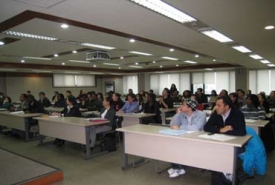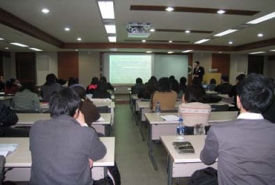2012.03.14
CAMPUS Asia Ph.D. Seminar (KDI School, Seoul)
The CAMPUS Asia Ph.D. Seminar took place March 14th at KDI School (KDIS) in Korea.
Four GRIPS Ph.D. students gave presentations to KDIS faculty members and students. After the presentation, students had a very lively exchange of views among all participants, and the discussion was highly productive. Also, Professor Sonobe of GRIPS gave a special lecture in the afternoon, and his humorous lecture received very favorable feed back. KDIS MA students raised many questions during the Q&A and had very fruitful discussion.
  |
Pictures of KDI School One-day Seminar
<Ph.D. Students Presentations>
●9:50-10:20
Speaker: Mr. Akira SHIBANUMA
Title: Improving management and performance through KAIZEN – Teaching KAIZEN and non-KAIZEN management practices to manufacturing SMEs in Ethiopia
Abstract: This presentation highlights evidence of improving management practices exercised by entrepreneurs who run metalworking small and medium enterprises (SMEs) in Ethiopia through two types of training, the classroom training at a central venue in the cluster and an on-site training at an entrepreneur’s site. Both of the programs improved management practices, but the impact was the most significant when KAIZEN practices were taught in the on-site training. Network among other entrepreneurs accelerated the adoption of more management practices.
●10:20-10:40
Speaker: Mr. Kairiza TERRENCE
Title: Impacts of teaching managerial skills to micro-entrepreneurs: Experimental evidence from Tanzania
Abstract: The study is based on a randomized field experiment with management training that was carried out amongst garment manufacturers in Dar es Salaam, Tanzania. We assess the impacts of three forms of management training on the managerial practices of the entrepreneurs as well as on their financial performance.
●10:55-11:25
Speaker: Mr. Yuki HIGUCHI
Title: Management Practices: Linking Human Capital and Enterprise Performance -Evidence from Village-based Industrial Cluster in Northern Vietnam-
Abstract: In manufacturing sector, researchers have found that human capital is important for enterprise performance. However, the mechanism how human capital relates to firm’s performance is yet to be revealed. We hypothesize that management practices link human capital and performance of enterprises and we test the hypothesis using data collected in a village-based industrial cluster in Vietnam.
●11:25-12:55
Speaker: Ms. Ryoko SUSUKIDA
Title: Counter-cyclicality of suicide and its potential sources:Evidence from Japanese prefecture data
Abstract: This study investigates the association between economic fluctuations and suicide. There has been found a positive relationship between unemployment rate and suicide rate and such associations are found to be much stronger for males. This study extends existing studies to explore relations among economic fluctuations, mental well-being and treatment seeking behaviors. It’s been found that perceived mental distress and treatment seeking against psychiatric disorders are also found to increase during recession. Economic downturns generally seem to have a detrimental effect on mental well being overall.
<Special Lecture>
●13:30-15:00
Speaker: Dr. Tetsushi SONOBE
Title: A Primitive Study of Productivity in Developing Countries
Abstract: There has been increasing interest in the within-firm determinants of productivity, such as capabilities to innovate and imitate and managerial capabilities. This lecture begins by reviewing the major findings from the recent empirical studies that directly measure managerial capabilities. We then turn to the reality of firm management in developing countries and discuss how wildly it varies among firms and how strongly it can affect firms’ productivity, longevity, and growth. The lecture goes on to discuss somewhat counter-intuitive relationship between productivity and firm size, the prospect of improving managerial capabilities, and the prospect of drastic improvement or innovation in productivity, based on case studies and experiments in a number of study sites across Asia and Africa.







